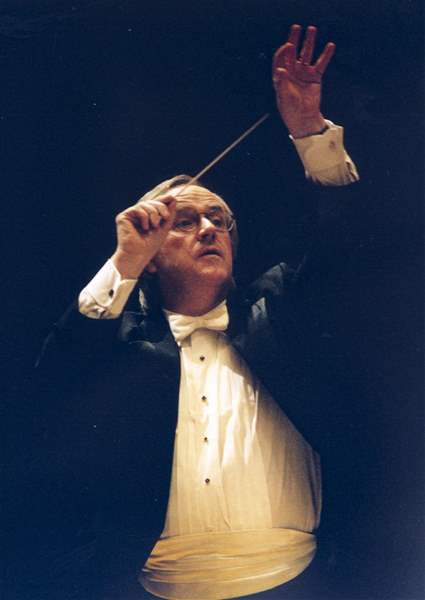
Andrew Massey (1946-2018)
6/2/2018
Andrew Massey
Andrew Massey, the seventh music director of the Toledo Symphony who brought audiences works across eras and of diverse styles, including those of Beethoven, Mahler, Elgar, and contemporary American composers, died Friday in his Vermont home. He was 72.
His death followed “a long and valiant battle against cancer,” according to a statement issued by Robert Bell, symphony president emeritus, and Zak Vassar, symphony president and chief executive officer.
Mr. Massey became Toledo Symphony music director in 1990. He remained with the orchestra in that role until 2001 and continued on in 2002 as a principal guest conductor.
“In my mind, he really demonstrated what a music director was supposed to be,” said Mr. Vassar, 38, who grew up attending Toledo Symphony concerts under the baton of Mr. Massey. “He shaped that concept for me. I was happy to be in his audience.”
That period in Toledo Symphony history was “a transformative time, establishing the orchestra in a substantive artistic way,” Mr. Bell said.
Mr. Massey and his wife, Sabra, resided in Maumee with their family during his tenure.
He was born in England and studied at Oxford University, where he earned bachelor’s and master’s degrees. He also earned a master’s degree in analysis of contemporary composition techniques from the University of Nottingham.
Mr. Massey emigrated to the United States in 1978 to become the assistant conductor of the Cleveland Orchestra.
“Every music director brings something special. He definitely brought a British flavor,” said Richard Anderson, chairman emeritus of The Andersons and a longtime symphony board member. “The orchestra grew and prospered under that. He was a fine human being. We were close friends.”
The maestro’s many firsts for the Toledo classical music community included performing Benjamin Britten’s “War Requiem” to help commemorate the 50th anniversary of World War II’s end. He also performed Edward Elgar’s massive choral work, “The Dream of Gerontius,” and revived the presentation of large-scale works at Rosary Cathedral with Ludwig van Beethoven’s Ninth Symphony and Hector Berlioz’s “Requiem.”
He was a devotee of the works of Gustav Mahler — his Ohio license plate was “MAHLER” — but also led the orchestra in the music of such contemporary composers as John Adams and Toledo native Stanley Cowell.
“He was eclectic,” Mr. Bell said. “He was a person who was comfortable in every genre. He could do the classics and baroque and the Bach thing. He was committed to contemporary composers — living and those well regarded in the 20th century.”
Mr. Vassar first heard Mahler’s Third Symphony performed by the orchestra under Mr. Massey.
“It was one of those life-changing moments,” Mr. Vassar said.
Mr. Massey’s interest in lofty, larger-than-life pieces matched his interest in philosophy, Mr. Bell said.
“He was a thoughtful person, a real intellectual, frankly,” Mr. Bell said. “He befriended many people outside the symphony family. He could hold his own in any conversation.”
Mr. Massey encouraged Mr. Vassar as a high school student to take an active role in classical music. And the maestro went out of his way — say, in the aisles of The Andersons general store -— to speak with people about the orchestra and encourage them to attend performances.
“He was really engaged in the community,” Mr. Vassar said. “It wasn’t celebrity he was seeking. It was to be a good community steward of the arts.”
According to Middlebury College in Vermont, where he served as orchestra conductor later in life, Mr. Massey had at times been associate conductor of The San Francisco Symphony and New Orleans Symphony, and a conductor or leader of the Rhode Island Philharmonic, Fresno Philharmonic, Oregon Mozart Players, the Milwaukee Symphony, the Racine Symphony, and the Indonesian National Symphony Orchestra in Jakarta.
He also spent six years as a senior music lecturer at Middlesex University in London, and was once a visiting scholar at Brown University, according to Middlebury.
Mr. Massey was a composer himself, writing pieces for orchestra members.
In a 2002 interview, Mr. Massey said he was leaving Toledo after a decade-plus because he didn’t want to become stale.
“Everyone has his limitations, and I think I have probably done what I can. Someone with a different set of strengths and weaknesses is bound to redress the lopsidedness that inevitably comes from a long tenure,” he said back then. “Ten years is enough in any performing job.”
On July 4, 2002, he became a U.S. citizen, along with 22 others, in a ceremony under Perry's Victory and International Peace Memorial on South Bass Island.
Survivors include his wife, Sabra; son, Sebastian, and daughter, Robin.
Arrangements had not be announced late Friday.
Contact Mark Zaborney at mzaborney@theblade.com or 419-724-6182.